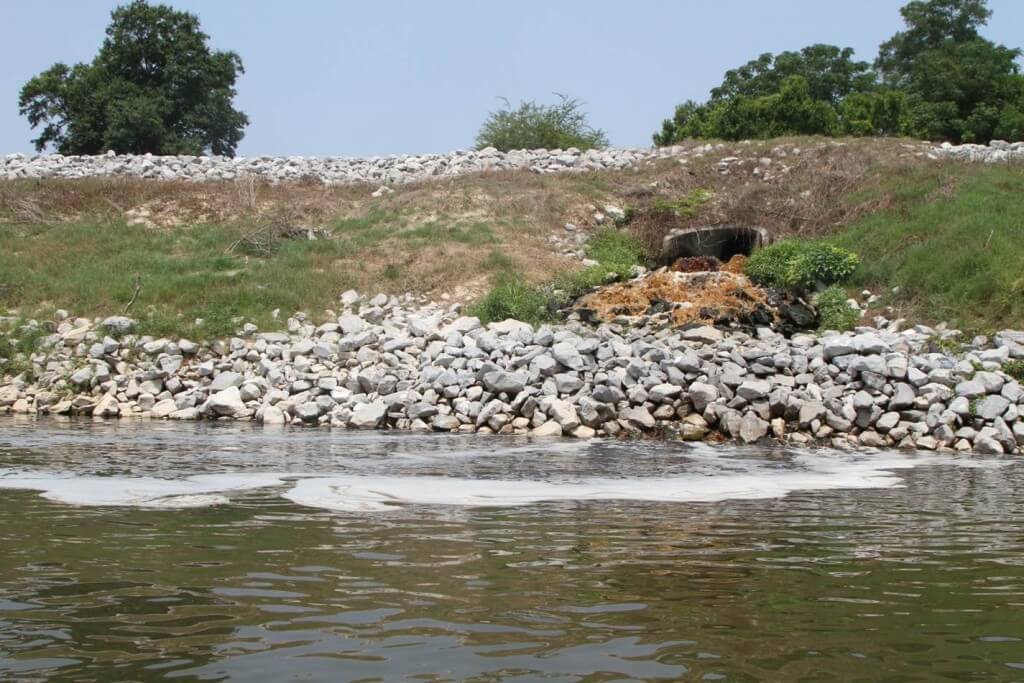The Clean Water Act in Play in Mississippi
For many years, there had been significant complaints about Hattiesburg, Mississippi’s two sewage lagoons discharging sewage into the already impaired Bowie and Leaf Rivers without regard to public health or the law. In March of 2010, a particularly foul odor had begun permeating the city, affecting businesses and the quality of life for thousands of residents.
When the Gulf Restoration Network (GRN) were first put on notice of the issue, GRN staff canoed the Leaf River and discovered brown, smelly water dumping into the river from the South lagoon, significantly changing the character of the river downstream. On the Bowie River, near the North lagoon, GRN discovered floating particles of what appeared to be human waste, and some of the canoes used had a brown “bathtub” ring around them when removed from the water.
Along with losing recreational use, the wildlife and ecosystems of the rivers and downstream areas were being impacted. One of the biggest concerns was high levels of biochemical oxygen demand, which reduces oxygen levels, stressing aquatic life and potentially leading to fish kills. Other issues included total suspended solids, which measures mineral or organic particles in the water and can impact the health of fish and other aquatic organisms, and fecal coliform, which can indicate the presence of human waste and disease causing pathogens.
GRN’s research revealed that both facilities were violating their permit limits for fecal coliform –a serious public health threat. According to the city’s own monitoring reports, the city had chronically violated its permitted limits for pollutants at both of these facilities for over twenty years.
GRN, represented by the Tulane Environmental Law Clinic, sent a notice of intent to sue detailing the City’s numerous and ongoing violations to the U.S. Environmental Protection Agency (“EPA”), the Secretary of Mississippi Department of Environmental Quality (“MDEQ”), the U.S. Attorney General, the Mayor of the City of Hattiesburg, and the Director of Water and Sewer for the City of Hattiesburg pursuant to Clean Water Act § 505(b)(1)(A), 33 U.S.C. § 1365(b)(1)(A) and 40 C.F.R. § 135.3(a). GRN attempted to discuss the settlement with the City, but they refused, which resulted in the GRN filing suit in the U.S. District Court for the South District of Mississippi.
Much of GRN’s work to get the Hattiesburg sewage treatment plant cleaned up was grounded on Clean Water Act trainings from River Network, going back 10 years. The resources fromRiver Network, such as the Clean Water Act Owner’s Manual and “Train the Trainers” workshops gave GRN staff some of the skills to fight the sewage pollution.
On September 29, 2014, Judge Keith Starrett of the U.S. District Court for the Southern District of Mississippi signed a consent judgment between GRN represented by the Tulane Environmental Law Clinic, the City of Hattiesburg and the Mississippi Commission on Environmental Quality to settle GRN’s suit against the city for Clean Water Act violations stemming from discharges from the city’s sewage treatment lagoons to the Leaf and Bowie Rivers.
The consent judgment requires the city to design and construct a plant that can treat the city’s wastewater sufficiently to meet its permit limits and other discharge requirements of the Clean Water Act by September 2018. It also requires the city to fund a water quality monitoring station in the Leaf River, downstream of its discharges, to gauge the health of the impacted river. In addition to the consent judgment, GRN negotiated amendments to an agreed order between the MCEQ and the city that imposes financial penalties if the city fails to meet design, construction and compliance deadlines. The amended order also strengthens the interim permit limits the city must meet until September 2018.
The residents and businesses in Hattiesburg, as well as the health of both rivers, are the beneficiaries of this settlement. The GRN is now monitoring the South lagoon/plant settlement with the City of Hattiesburg, including review of their discharge monitoring reports to ensure that they are meeting the minimum limits set by the settlement.





